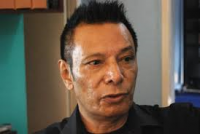Difference between revisions of "Shivananda Khan"
| (One intermediate revision by the same user not shown) | |||
| Line 35: | Line 35: | ||
Throughout his life, Khan received numerous awards and recognitions for his activist work. This culminated in his admission as a member of the Order of the British Empire in 2005. | Throughout his life, Khan received numerous awards and recognitions for his activist work. This culminated in his admission as a member of the Order of the British Empire in 2005. | ||
| − | Khan himself faced declining health, and it is believed he died by committing suicide at this home. He is remembered as a passionate, inspiring, committed, and visionary individual who did much to rally India, Asia, and the Pacific worlds around the issue of HIV-AIDS. | + | Khan himself faced declining health, and it is believed he died by committing suicide at this home. He is remembered as a passionate, inspiring, committed, and visionary individual who did much to rally India, Asia, and the Pacific worlds around the issue of HIV-AIDS. The Shivananda Khan Award for Extraordinary Achievement was created in his honour and is awarded annually by the Regional HIV and LGBT adovcacy organization, APCOM. |
==See Also== | ==See Also== | ||
* [[LGBTQ Founders and Executives with Charitable Foundations]] | * [[LGBTQ Founders and Executives with Charitable Foundations]] | ||
| + | * [[Global LGBTQ HIV/AIDS Activists]] | ||
==Further Reading/Research== | ==Further Reading/Research== | ||
| Line 45: | Line 46: | ||
* http://www.gaystarnews.com/article/south-asia-gay-community-mourns-death-shivananda-khan220513 | * http://www.gaystarnews.com/article/south-asia-gay-community-mourns-death-shivananda-khan220513 | ||
* http//www.apcom.org/honouring-shivananda-duncan-george-khan-obe | * http//www.apcom.org/honouring-shivananda-duncan-george-khan-obe | ||
| + | |||
| + | <html><br /> | ||
| + | <a href="#" | ||
| + | onclick=" | ||
| + | window.open( | ||
| + | 'https://www.facebook.com/sharer/sharer.php?u='+encodeURIComponent(location.href), | ||
| + | 'facebook-share-dialog', | ||
| + | 'width=626,height=436'); | ||
| + | return false;"> | ||
| + | Share on Facebook | ||
| + | </a></html> | ||
Latest revision as of 21:14, 29 November 2018
Contents
[hide]Country
India
Birth - Death
1948 - 2013
Occupation
Activist
Notable Achievements
OBE
Description
Shivananda Khan was a global LGBTQ rights pioneer who worked to improve laws and legislation regarding the LGBTQ community in diverse geographies from Europe to Asia to the Pacific. His most notable success was in challenging India’s Section 377 (the Victorian-era law that criminalized gay sex) in the high court in 2009.
Khan was born in a remote north-eastern state of India to a family encompassing diverse religious and ethnic identities. At the age of ten he was sent to England for education. He grew up in the U.K. and went to university in Manchester in the 1960s. While in the U.K. he created an organization for South Asian gay men and lesbians called Shakti.
After witnessing the lonely death of a gay Muslim in 1990 who had been rejected by his family for contacting AIDS, Khan founded the NAZ Foundation in his memory. This organization works throughout the Asian and Pacific worlds to address homophobia and the lack of co-ordinated policies on education, health issues, and treatment of HIV-AIDS in the region. Khan worked to ensure that access to HIV protection, treatment and care was seen as a human rights issue.
In the process, Khan turned his attention to homophobia in India and the wider South Asian region itself. This grew to include Nepal and Bhutan, Sri Lanka and Bangladesh, Afghanistan and Pakistan. In Khan’s observation, he noted that HIV-AIDS transmission in these unique cultures was occurring between male-on-male sex not just because of homosexual attraction, but also simply because it was sex. This meant that the risk of transmission was greater than in western countries.
To address this challenge, Khan developed education programs to change the way society in the region sees gender, sexuality, masculinities, and femininities. In his studies, having a gay identity in the region was linked to class and income and not a generic framework. Khan was well connected throughout the region, enabling him to build a coalition of governments and organizations to address the issue in this context.
The result was his founding of the Asia Pacific Coalition on Male Sexual Health (ACOM). This organization brought together governments with the United Nations organization and civil society to address the health and social development agenda for the Asia and Pacific region on the issue of HIV-AIDS. Khan was the founding Chair of APCOM.
Khan’s most notable achievement in the field of LGBTQ rights came in 2009 when, through the NAZ Foundation, he successfully challenged India’s Section 377 which criminalized gay sex. This was a monumental change for both the country and the entire Pacific region. Khan saw this change in law as an important step because it allowed the issue of HIV-AIDS to be addressed more clearly and openly. The point was to remove the barriers to the encouragement of the participation of doctors, donors, governments, and NGOs to openly talk about issues relating to male-on-male sex and HIV – they would not do so if homosexuality was labelled a criminal act.
Throughout his life, Khan received numerous awards and recognitions for his activist work. This culminated in his admission as a member of the Order of the British Empire in 2005.
Khan himself faced declining health, and it is believed he died by committing suicide at this home. He is remembered as a passionate, inspiring, committed, and visionary individual who did much to rally India, Asia, and the Pacific worlds around the issue of HIV-AIDS. The Shivananda Khan Award for Extraordinary Achievement was created in his honour and is awarded annually by the Regional HIV and LGBT adovcacy organization, APCOM.
See Also
Further Reading/Research
- http://www.gaystarnews.com/article/south-asia-gay-community-mourns-death-shivananda-khan220513
- http//www.apcom.org/honouring-shivananda-duncan-george-khan-obe

